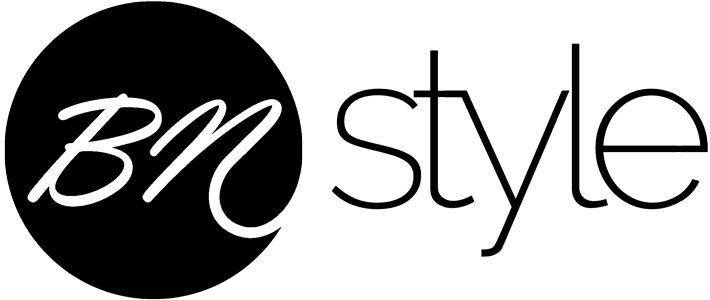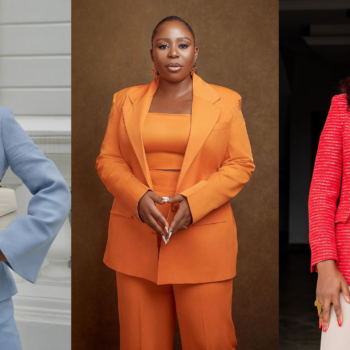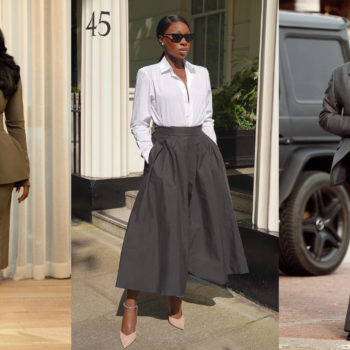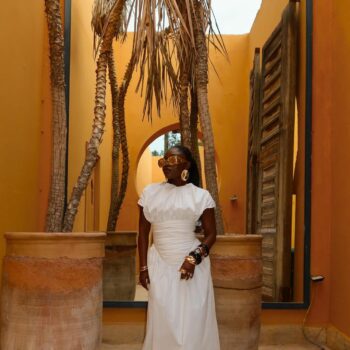Philomena Kwao took the modelling industry by storm when she became the face of the trendy, clothing line, Torrid. Since then, she’s also modelled for top brands such as Nordstrom, Lane Bryant and Evans. She’s also been featured in known publications such as Sports Illustrated, Cosmopolitan UK, and Pride magazine.
Standing at a statuesque 5’10, her flawless melanin enriched complexion owing to her West Africa ancestry, made her stand out along with her firm resolve to pave a way for plus-size African models.
The British-Ghanaian has many philanthropic interests and preaches the need for an open dialogue and real inclusivity in the movement towards equal rights for women.
Recently announced as the global ambassador for the Women For Women International Charity, Philomena visited Nigeria to celebrate with the women who are graduating this year’s program and have achieved access to life-changing skills to move from crisis and poverty to stability and economic self-sufficiency.
BellaNaija Style‘s Mary Edoro caught up with the model and she talked about the journey so far and her plans to revolutionize the way the industry views plus-size models.
_________
How did you get into modelling?
My original career choice was very different and my journey into modelling began by chance as I had planned out a career in health management and policy after completing my master’s degree. A friend of mine entered my details online into a modelling competition in which Evans and Cosmopolitan in conjunction with Models1 were looking for a new plus-size model to front their shape campaign and to also become the Face of Style 369. I eventually won the competition and hence my career began. I was going to take a career break anyway after my masters as I had continued through school and work with no break. So when the opportunity came for me to move to NYC a new adventure made perfect sense. I could make money and travel which were two of the things I wanted to do most at the time. It was a huge blessing. I originally set out to try modelling out for a year. One year turned into seven and here I am today. It’s been an incredible journey so far. I am now signed to JAG Models and I am living and working in NYC.
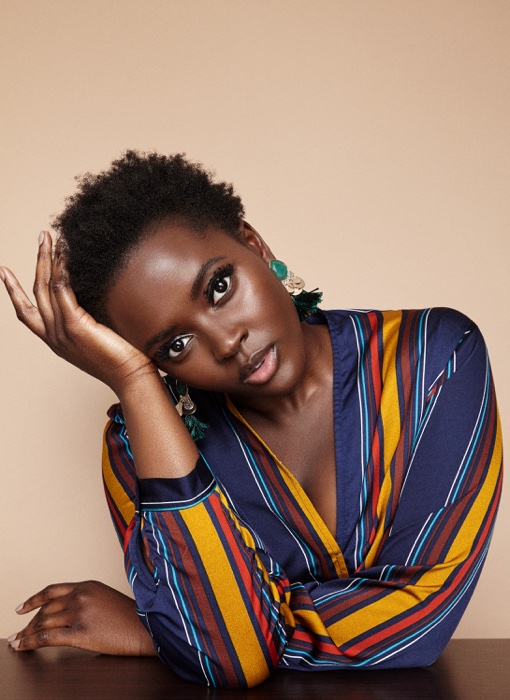
Tell us about how you landed your first big modelling gig, and how that made you feel
When I first got to NYC I didn’t work at all. It was hard! My look was new. I was everything you weren’t supposed to be rolled into one. Dark skin, plus and a shaved head. What would brands do with me? It took a while for me to find my place in the industry but when a few brands like Lane Bryant, Landsend and Torrid took the plunge to try something new and widen the definition of beautiful my career really took off. It was incredibly exciting and terrifying at the same time because I had no idea how to model and I didn’t understand the industry and my place in it. In a way, that naivety has been my saving grace.
As a plus size Ghanaian model in Britain, what have been some of the challenges you have encountered?
For so long, in the West, the standard of African Beauty was (and arguably is still) very very narrow. Extremely tall, extremely thin and extremely dark. Most of the African models hailed from East Africa and the west fetishized their beauty as exotic and a true representation of The African woman. There are many problems with this. Africa is a vast continent with hundreds of thousands of ethnicities each with their own beauty. To homogenize the African woman is limiting and dangerous. My beauty is common in Africa but in the West, it’s what defines me and sets me apart. When I first started I was different from anything that existed in mainstream fashion. I had a shaved head, my features are more commercial and I am a plus sized woman. It was very
hard for people to get their head around it.
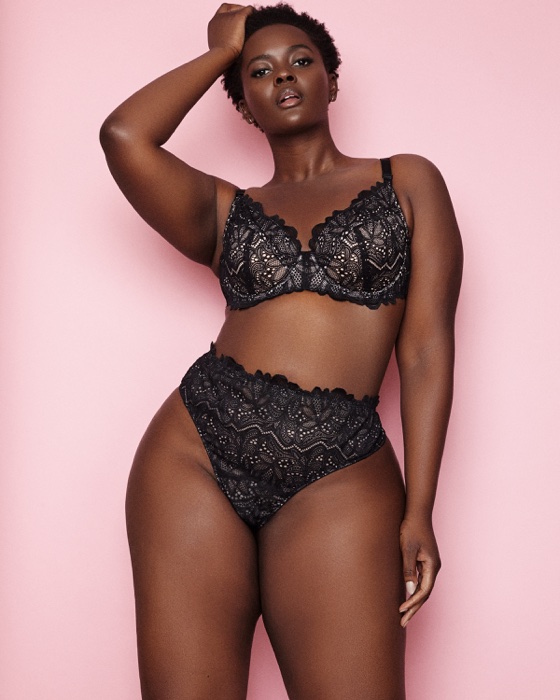
Typically plus-size models are white and hourglass, and when they are black they are of a fair complexion with an acceptable hair texture. If they were slightly darker they had a long weave. The typical American girl next door look. African models were typically slim tall and dark. And yet here I was a mixture of everything; too ‘exotic’ for commercial modelling, too big for mainstream high fashion modelling. My biggest challenge was getting people to understand that black beauty exists in an infinite number of forms. This wasn’t easy, a big push for my career was definitely when Lupita was recognized as a world-class beauty because then I became the plus size Lupita.
Congrats on becoming the Global Ambassador for the Women International Charity! How important is this role and what plans do you have for your tenure?
I’m very much interested in my first love and passion; the advancement of women around the world. Whether through health, economic empowerment or social empowerment, women around the world need advancement. For too long we have been globally oppressed. The time for change is now and everyone can create change, firstly within themselves and then in their wider community. Social media has become such a powerful tool for this. One of the many blessings that my modelling career has given me is a platform and when I heard about the work women for women were doing I felt compelled to support. Women for women empower the women they work with by teaching them how to make a change within themselves and in their community. The year-long social and economic empowerment program provides marginalized women with the opportunity, often for the first time in their lives, to come together in classes of 25 women to build support networks, to share experiences, to learn critical skills, and to access new resources.
Women for Women International supports the most marginalized women in countries affected by conflict and war. Their programs enable them to earn and save money, improve health and well-being, influence decisions in their home and community and connect to networks for support. By utilizing skills, knowledge, and resources, women are able to create sustainable change for themselves, their family, and community. This is something I truly believe in. As an ambassador, sending the message out to the general public is very important as public support and sponsoring is needed for WfWi to continue their work. Spending time in Nigeria, documenting my journey and sharing it on my social media platforms is how I have done this and will continue to do this.
What are you working to change in the fashion industry?
Hopefully, I am and will continue to change the industry inside out. Every time a brand decides to use m, they use a different ray of black beauty and the definition of beauty is widened even more. Many women who identify with me and my story will feel included, relevant and hopefully push for more change.
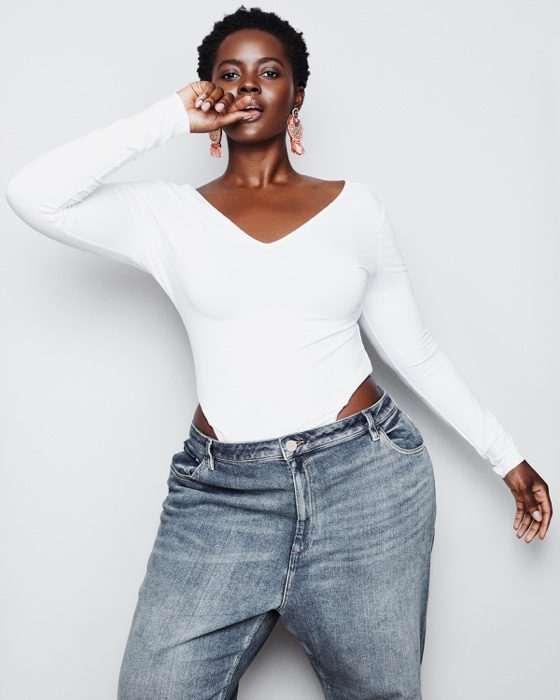
Favourite African dish: Banku and Okra Stew
Favourite place to visit in Africa: Bolgatanga, Ghana
Style uniform: Skinny jeans and a loose V neck tee
Life quote/philosophy: Whatever you do in life, do it and do it well.
_______
Connect with Philomena Kwao on Instagram: @philomenakwao
